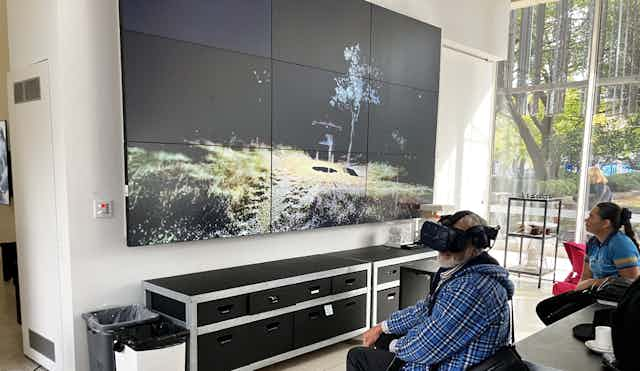The Olkola people from Queensland’s very remote Cape York Peninsula gained their land back through a native title claim in 2014. Since then, they have undertaken land management using traditional fire techniques, habitat protection and restoration and cultural tourism.
The Olkola are in the process of building a Cultural Knowledge Centre on their Country. The centre will support the Olkola people’s practices and showcase their culture to the world. During the Cultural Knowledge Centre design process, the Olkola identified the need to find, repatriate, document and share their cultural stories and archives.
In support of this vision, they formed the Traditional Owner-led project, Getting Back on Country. The project is led by the Olkola Aboriginal Corporation and the Olkola Rangers in collaboration with researchers at the University of Melbourne, including authors Hannah Robertson and Rochus Urban Hinkel.
In partnership with the researchers, the Olkola are using digital technologies including virtual reality and augmented reality to capture their cultural stories. These digitised stories, as well as Olkola artefacts, are to be kept and shared at the Cultural Knowledge Centre.
These digital technologies will also help to bring Country to Olkola Traditional Owners with dementia or disabilities who are unable to travel to Country.
Nukakurra: a new way to visit Country
This is important work for Olkola people. Today we have a lot of people who can’t move, are in hospital or can’t get back on Country. We want to take Country back to them, so if they’re lying in a hospital bed, they’re lonely and nobody’s visiting, they’ve got something there that can take them back on Country and remind them where they came from. We believe this will be a healing medicine for people.
To realise this vision, we decided to create the Getting Back on Country Project. We began our collaboration by focusing on the Nukakurra Walking Trail as a pilot process for creating a digital cultural story.
Nukakurra is a cultural story place with a loop walk that passes several Olkola significant sites. Some of the sites in Nukakurra include the Blue Tongue Lizard dreaming site, an old Olkola campground and the Crocodile dreaming site. These dreaming sites are sacred to Olkola people because they are the creation places of these animal spirits which continue to walk across Olkola Country.
Author Melissa Iraheta and University of Melbourne researcher Mitch Ransome travelled to Olkola Country with the Olkola Rangers to document Nukakurra. Using 360-degree microphones and cameras, Lidar scanners (a laser used for determining distances between objects that can be used to create 3D landscapes), photogrammetry (which involves collecting overlapping images to build 2D or 3D models) and drones, they spent a week documenting the key sites.
Robertson and Uncle Mike Ross then travelled to Olkola Country with Olkola Elder Uncle Jack Lowdown and other senior elders to document the cultural story audio for Nukakurra in both English and Olkol using a 360-degree microphone.

This process highlighted the power of yarning and the connections between the sites of significance. Uncle Mike created a new story of a grandfather and grandmother walking the Country and passing the sites with their grandchildren and sharing their knowledge as they did – just as it would have happened in the old world prior to colonisation.
The process also highlighted the limitations of the technologies in the remote context, with cameras overheating and the 360-degree microphone struggling to capture audio while walking. Now we have these stories, the final stitching of the Nukakurra cultural story place experience is being developed as a 360-degree film experience.

The importance of preserving story
The pilot digital experiences for the Nukakurra Olkola cultural story place are still in development. In May, three generations of Olkola people shared their experiences of working with the University of Melbourne on the Getting Back on Country and Olkola Cultural Knowledge Centre projects.
During this yarn, Olkola woman and project manager for the Olkola Aboriginal Corporation, Katherine Samuel, reflected on the data collection process:
[Uncle Mike] saying welcome [to Nukakurra] in English and Uncle Jack saying it in [Olkol] language and Mitch holding the 3D camera and collecting all that data, it was so much. And when they came up March this year, Grandad Mike put on the VR goggles, wow it was so cool. To be able to sit in the office and feel like you were there. It was really cool; we were able to collect data with multiple technologies.
There are hopes to continue to expand the collaboration with the Olkola in a larger project. We aim to encompass multiple cultural story sites and find and repatriate Olkola cultural archives. It is our hope this can provide a process for other traditional owner groups to explore and preserve their respective stories on their own Country.
We wish to acknowledge the contributions of all of the Olkola people involved in this project. In particular, we would like to acknowledge Olkola woman Katherine Samuel of the Olkola Aboriginal Corporation, Olkola elder Uncle Jack Lowdown and Mitch Ransome from the University of Melbourne for their contributions.

